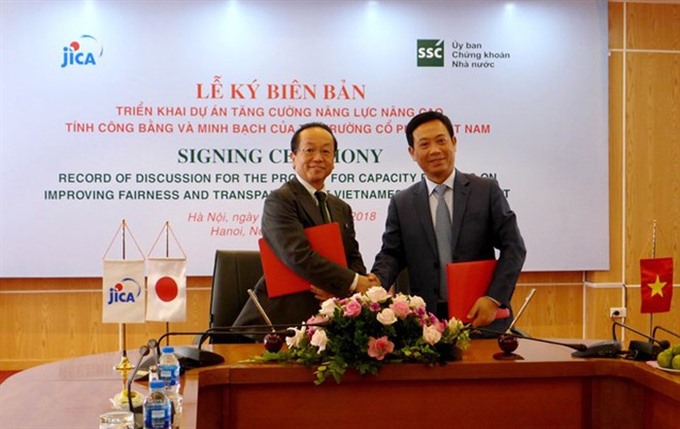The State Securities Commission (SSC) and the Japan International Co-operation Agency (JICA) on Monday signed a project agreement to improve the quality, transparency and equality of the Vietnamese stock market.

The State Securities Commission (SSC) and the Japan International Co-operation Agency (JICA) on Monday signed a project agreement to improve the quality, transparency and equality of the Vietnamese stock market.
JICA will help the SSC and the two local exchanges – the Ho Chi Minh Stock Exchange and the Ha Noi Stock Exchange – will raise their capacity in monitoring the stock market and market members, managing the share listing and issuance, and raising awareness of local companies over protecting their investors.
Under the three-year project agreement, which starts in 2019, JICA will support local market regulators review legal frameworks, provide training activities, update manuals and adjust relevant policies.
The project is developed as an addition to Viet Nam’s plan on securities market development for 2012-20 that was approved by the Prime Minister in 2012, targeting to make the Vietnamese market integrate into regional and international markets.
According to JICA, the Vietnamese stock market value has increased significantly in recent years thanks to the strongly-growing economy and fast-changing private sector.
In addition, the Government has done well and had drastic measures to push the equitisation of State-owned enterprises (SOEs), including the State-run corporations and groups that play important roles in the Vietnamese economic development.
Besides, more private companies have listed their shares on the two local stock exchanges, which helps expand their business operations and diversify capital resources.
The Vietnamese stock market has been developing for more than 18 years and its value has reached 80 per cent of the country’s gross domestic product (GDP), SSC chairman Tran Van Dung said at the signing ceremony.
The bond market accounts for 30 per cent of GDP, including 22 per cent contribution from the government bond market, Dung added.
Therefore, he said the combined value of Viet Nam’s stock and bond markets has exceeded the economy’s GDP.
The Vietnamese securities market has received assistance from Japanese partners, including stock exchanges and financial institutions, Dung said.
There are currently 21,000 foreign accounts investing in Vietnamese assets, of which 7,000 accounts are Japanese.
“The signing of the project agreement is essential for the Vietnamese securities market as it has been developing too fast while the quality of management, transparency and corporate governance has remained low,” the SSC chairman said.
Dung hoped the project would help the SSC and the two local exchanges develop a sustainable Vietnamese securities market, thus strengthening the confidence of Japanese investors in the assets.
According to Konaka Tetsuo, JICA chief representative in Viet Nam, the Vietnamese securities market has room to grow in the future in terms of both volume and value.
The local market has lured more foreign investors in recent years thanks to its rapid development and fast progress of SOE equitisation, he said.
As investors have raised their standards, it is important to create a friendly environment so that the Government may maximise the potential of the market, he added.
Thus, there is no other way than making the market more equal, transparent and efficient in the future, Konaka said. — VNS





